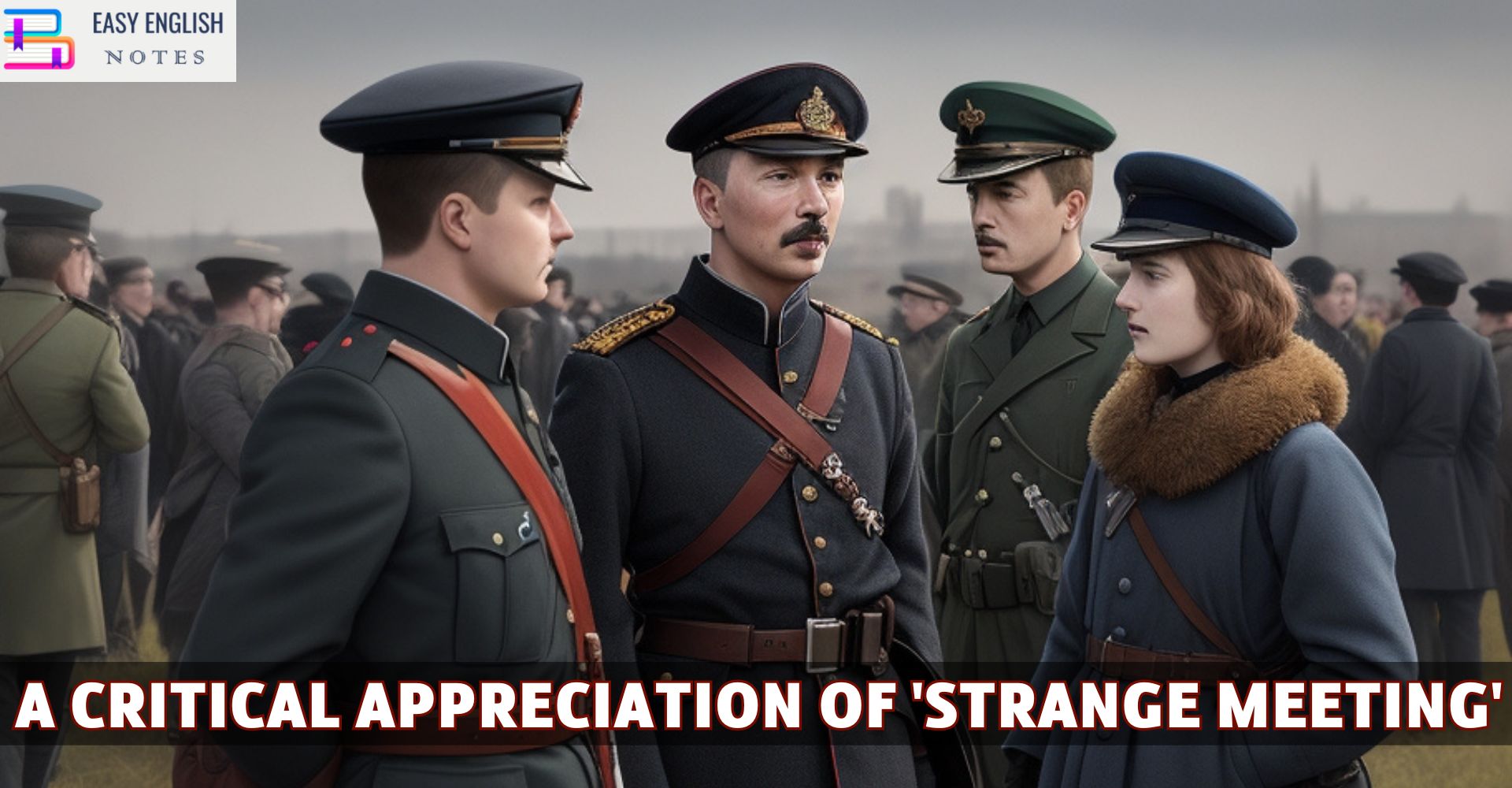“Strange Meeting” is one of Wilfred Owen’s most famous and poignant poems, written around 1918. The poem is a powerful anti-war piece, renowned for its haunting portrayal of the horrors of war and the futility of conflict. It is often celebrated for its emotive power, vivid imagery, and profound exploration of themes such as the senselessness of war, the shared humanity of soldiers, and the tragic loss of young lives.
“Strange Meeting” has the intense sadness of the dramatic vision where two soldiers, who killed each other, meet in hell. It has the grim tragic realism and the deep pensive pathos of the little lyrics and sonnets. In this poem Wilfred Owen gives vent to his personal experiences of horror and sadness of war. Owen took part in the First World war. He was recruited a soldier in the war.
In this poem Owen represents a tragic and pitiful experience. His approach is realistic. He stresses the waste and devastation caused by war. He once said; My study is war and the pity of war. The poetry is in the pity. In this poem he imagines that he goes to the world of the dead. There he meets the German soldier whom he killed in battle the previous day. The dead soldier is sad because he cannot now tell the world the truth about war. He cannot tell the tragic impact of war. Unless he tells them about it, they will go on glorifying war, and killing and getting killed. The scene is dramatic and poignant.
Google Ads PPC Training Digital – membership area
An Exclusive Blood Sugar Balancing And Weight Loss
The poet feels that he has run away from the battle and has been spiritually hollowed. He visualizes the grim picture of war. He feels he has been forced to enter the underworld. He talks and exchanges views with his enemy whom he killed. He asks him many questions about the occurrence of war. He asks him to tell why this war breaks out. He gets no substantial answer. The mystery remains as usual. The truth is left untold. War is the most abominable phenomenon caused by the irrationality. of mankind. It is a great surprise that men fight just for trifle gains or no gains. Man has no wisdom except courage. That courage is misused. Peace brings out progress whereas war culminates into total collapse both to mankind and civilization. If, in poet’s view, war is avoided and peace is sought after, the progress will be over coming. Ideologies which are dangerous should be cast off. Instead of them the enemy within us should be killed and that enemy is none but the ill-will of the kings.
Also Read :
- Compare Hamlet with Macbeth, Othello and other Tragedies
- “The Pardoner’s Tale” is the finest tale of Chaucer
- Prologue to Canterbury Tales – (Short Ques & Ans)
- Confessional Poetry – Definition & meaning
- Line By Line Explanation Of The Poem The Eve of St. Agnes
In the poem, lines run in pairs but do not rhyme completely, the end syllables have the same consonants, but different vowels. e.g. scaped, scooped, groined, groaned.
Form and Structure:
- “Strange Meeting” is written in a form resembling a dramatic monologue or a dialogue, a structure that effectively conveys a sense of conversation between soldiers. This format enhances the poem’s intensity and immediacy.
- The poem lacks a regular rhyme scheme, which contributes to a sense of disorientation and unease, mirroring the chaos and confusion of war.
Imagery and Language:
- Owen employs striking and often hellish imagery to depict the landscape of war, creating a powerful contrast between the idealized view of battle and the grim reality. The opening lines introduce a surreal, underworld-like setting, evoking a sense of desolation and loss.
- The language used is both lyrical and haunting. Owen’s choice of words and phrases powerfully conveys the despair and horror experienced by soldiers.
Themes and Ideas:
- The central theme of the poem is the tragedy of war and its devastating impact on those who participate in it. Owen underscores the shared suffering of soldiers, irrespective of their nationalities.
- The poem presents a profound critique of the glorification of war. The encounter between the two soldiers, one alive and one dead, in a dream-like setting, symbolizes reconciliation and the realization of the senselessness of their conflict.
- There is a strong emphasis on the loss of innocence and the premature end of young lives, a recurrent theme in Owen’s poetry. The “pity of war” that Owen often talked about is palpably felt in this poem.
Emotional Impact and Tone:
- “Strange Meeting” is deeply moving, characterized by a tone of sorrow and lamentation. The emotional intensity of the poem lies in its depiction of the profound psychological scars borne by soldiers.
- The poem conveys a sense of profound sadness and regret, not only for the loss of life but also for the loss of potential and the destruction of human spirit.
Critical Reception:
- “Strange Meeting” has been widely praised for its powerful anti-war message and its ability to convey the horrors of war. Critics have noted the poem’s emotional depth, innovative use of imagery, and its haunting quality.
- The poem is often cited as one of Owen’s greatest works, encapsulating his skill as a poet and his ability to convey complex and powerful themes through his verse.
In conclusion, “Strange Meeting” is a masterful poetic exploration of the futility and tragedy of war. It stands as a testament to Owen’s talent for conveying the brutal reality of warfare and the shared humanity of those caught in its grasp. The poem remains a powerful and relevant critique of the senselessness of conflict, embodying Owen’s enduring message about the horrors of war.
PLEASE HELP ME TO REACH 1000 SUBSCRIBER ON MY COOKING YT CHANNEL (CLICK HERE)











